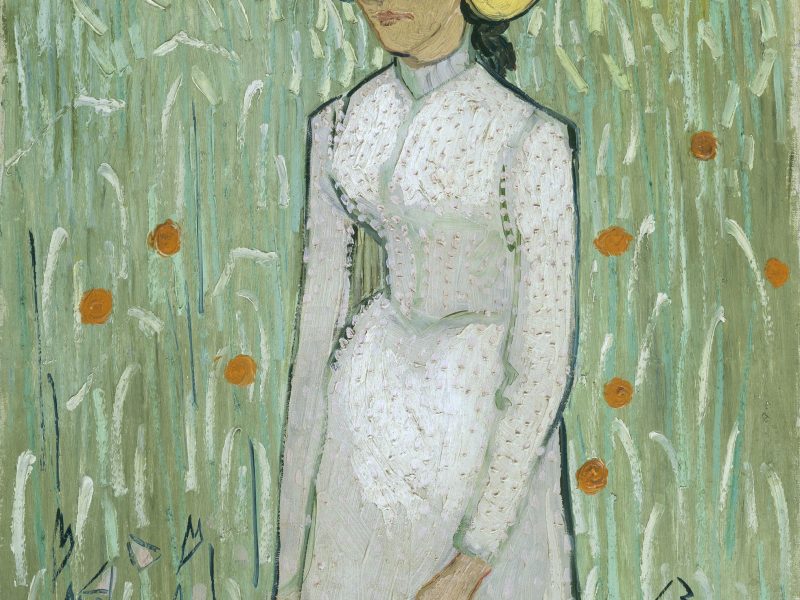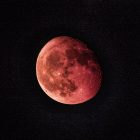Jennifer Michael Hecht’s poem “Gardener in the Wild” is an invigorating look into identity and the natural world.
Poetry
The Voyages of the Starship Enterprise
|
Jennifer Michael Hecht’s poem asks us: how does it feel to be post-exilic, post-textilic,
and post-Cyrillic?
Spirituality
Blood Moon
|
Delve into visions and religion on Easter eve in Patrick Donnelly’s poem “Blood Moon.”
Fiction & Poetry Articles
The Master of the Good Name
|
The Master of the Good Name who only lived for prayer, trembled by the holy ark because a Name so pure was more than a body could bear.
2015
Dante’s Politics
|
The decorative mosaic adorning the ancient synagogue floor
is innocent of its future. Good luck, it means to say, or
my swastika hands miming perpetual motion wish you
everlasting peace and prosperity. And what coincidence
sends my son running across the plaza, blowing again
and again on his precious pinwheel toy? Say what you mean,
I want to shout. I am listening to the politicians
in the courtyard, excavating for small truths buried
beneath thick stratum of tedious lies.
2015
Words of Devotion
|
Before the Door of God
Edited by Jay Hopler and Kimberly Johnson
The Sea Sleeps: New and Selected Poems
by Greg Miller
Once in the West
by Christian Wiman
Poetry
In Memory of C.K. Williams (1936-2015)
|
Pulitzer Prize-winning poet C.K. Williams reads “Tar” and “The Day Continues Lovely.”
Culture
From the Ruins of Europe: Lyacos’s Debt-Riddled Greece
|
If the postmodernists celebrated a departure from objective truths, Lyacos offers a vision of subjective return. Though his view is more pragmatic than ideal, Lyacos argues for a new interpretation of God, the Bible, and their roles in contemporary society.
2015
Writing and Spirituality
|
Nobody Home: Writing, Buddhism, and Living in Places
Gary Snyder, in conversation with Julia Martin
Trinity University Press, 2014
Nobody Home presents three interviews conducted by South African scholar and writer Julia Martin with the poet Gary Snyder that take place from the late 1980s to 2010, along with a selection of letters between them covering the same period. Martin was a young academic in apartheid South Africa when she first reached out to Snyder, motivated by her critical work on his poetry and thinking. Martin’s study and practice of Buddhism and her intuitive grasp of Snyder’s importance as a forefather of a growing international movement of spiritual environmentalism provoked Snyder to respond with sympathy and encouragement. They had an instant rapport in letters, which led to the interviews. This is a great period for Snyder, as his thinking about the nondualism of self/no-self and its relation to the world and all phenomena is culminating in his concentration on finishing Mountains and Rivers Without End, one of the crowning works of his generation of poets.
2015
Do You See Me
|
Between earth and Heaven? I’ve never been anything but alone. But your face warms my world. Everything that blooms, blooms from you. When you look at me,
My heart sweetens.
2015
Babel
|
They used to conspire in a brother tongue
no one else could parse. They were its sole native speakers,
these sons of mine
who grew up talking their way to the table. They come back as men to the keep
of my kitchen, the habit of food and talk,
leaving their rented rooms
half a life away. Who are these children-in-disguise
with their beards and glasses,
smoking and joking, each in his own tongue,
about who knows what? Don’t get twin beds, I begged my mother, afraid
of the slightest space
between him and her—a nightstand
with its drawers and knobs,
foursquare and stolid as a gravestone,
the two of them
buried on either side.
2015
The Poetry of a Jewish Humanist
|
Swimming in the Rain: New and Selected Poems 1980-2015
by Chana Bloch
Autumn House Press, 2015
A child of immigrant parents who was raised in an observant Jewish household, poet Chana Bloch has absorbed the details of her ethnic and linguistic heritage; this includes what she has called “the habit of questioning,” which is “not only sanctioned by Jewish tradition, it’s an honored part of it.” As a poet, biblical scholar, and translator of ancient and modern Hebrew poetry, she has followed her teacher Robert Lowell’s advice to “learn to write from [her] own translations.”
Swimming in the Rain: New and Selected Poems demonstrates that Bloch has converted that important lesson into a unique poetic voice that modulates from the homespun to the literary and shifts from wit and humor to a pull-no-punches toughness. Spare and musical, intimate while open to history, intelligent and emotionally rich in the details of divisions and connections, Bloch’s poetry negotiates the complexities of her identity as a first-generation Jew, a woman, a child, a parent, a wife, a lover, and a citizen. A self-proclaimed “Jewish humanist,” Bloch quarrels with tradition by asking why God has to make divisions. Some of the divisions she writes about include those between husband and wife, parents and children, illness and health, historical memory and momentary joy, and the contradictions within Judaism itself. Bloch critiques these divisions and, when she finds them, offers alternatives that are more inclusive and more humanistic.
Fiction & Poetry Articles
The Weighing of the Heart in the Hall of Truth
|
Heaven’s not for bodies, at least not my perfect one,
and mirrors in heaven still lie as on earth, and still disgust.
Heaven’s not for past or present or future. It’s not everything that should have happened but didn’t.
Dead faces there don’t bristle with hope, there’s no whiskery
feeling of some pointful life to which you never got around.
God’s so dark in heaven, like that car in the rear-view last night
with no headlights on.
2015
Pastoral Prose Poetry
|
Urban Pastorals
Clive Wilmer
Worple Press, 2014
In this short, rich book of prose poems, Clive Wilmer renews the pastoral tradition by eschewing romantic idealizations and coming into contact with the living image of an Eden corrupted by natural processes. Those processes, which connect us to the mystery of life and spirit, include both the workings of memory and the mechanisms of civilization. Wilmer’s memories are of a midcentury South London childhood “injured by enemy bombs”; of wooded commons where trees were “the very image of freedom in community”; of discoveries of Shakespeare’s power and Louis Armstrong’s musical “good place, where the leopard lies down with the kid”; and of art as “the expression of man’s pleasure in labour.” These memories form a groundwork for his warmly drawn and enigmatic human portraits, which enliven a religious vision that is convincing for its glowing clarity and sense of scale. Also recommended: Wilmer’s New and Collected Poems (Carcanet, 2012).
To view Tikkun Recommends as a PDF, click here.
Israel/Palestine
For Hazhir
|
Jon Swan’s poem about drones is a haunting vision. “The drone hovers under the iron-gray dome of heaven . . .”




